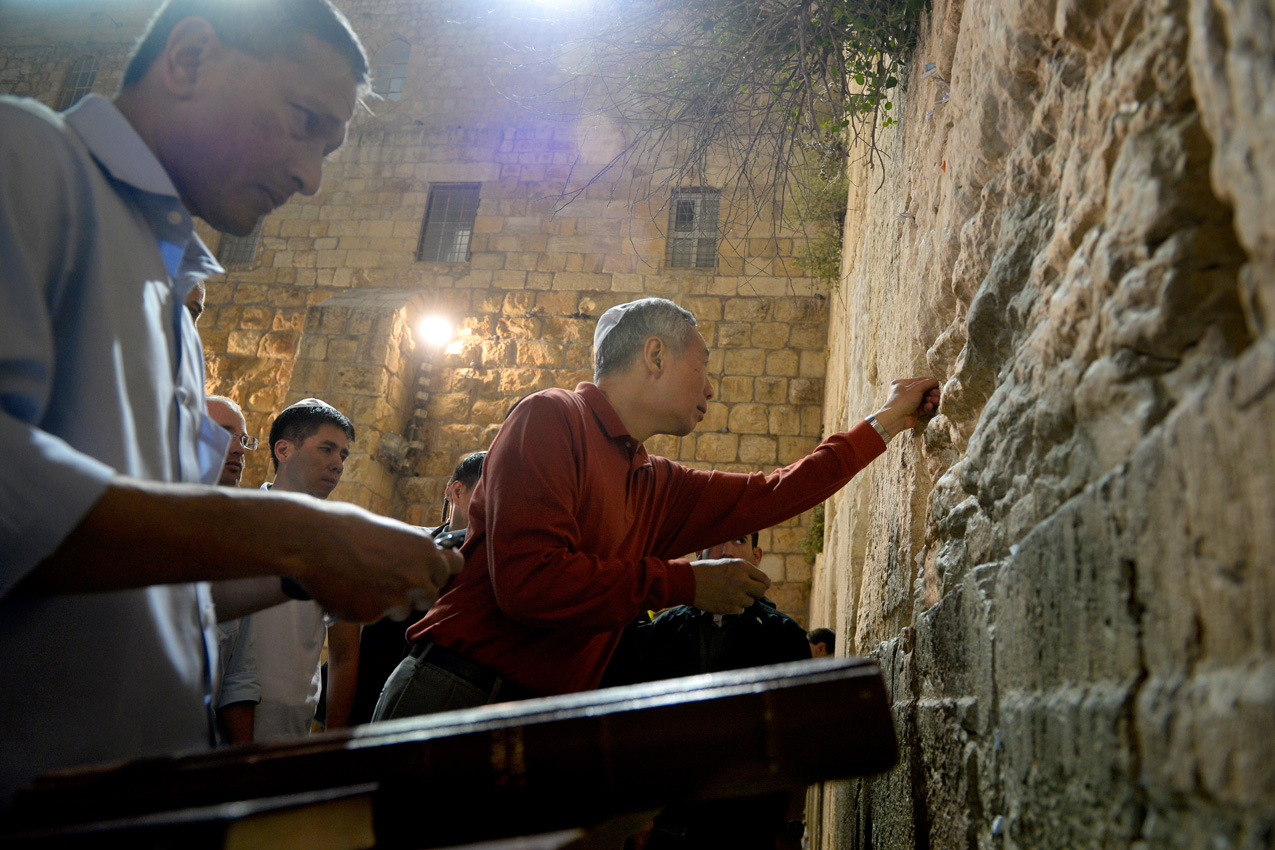Prime Minister Lee Hsien Loong arrived in Israel from Jordan yesterday, on the second leg of his week-long trip to the Middle East.
His first stop here was the Hebrew University of Jerusalem, where he met its leadership and received an honorary doctorate.
Speaking at the ceremony and thanking them for the honour, he took stock of Singapore’s long friendship with Israel, in particular the role it played in helping build a credible and professional Singapore Armed Forces (SAF).
“Without the IDF (Israel Defence Forces), the SAF could not have grown its capabilities, deterred threats, defended our island, and reassured Singaporeans and investors that Singapore was secure, and had a future,” he said. “We will always be grateful that Israel helped us and stood by us at a time of great need.”
PM Lee also expressed the hope that Israel and the Palestinians will take steps to resume direct negotiations and work towards a just and lasting two-state solution.
He noted that over the years, Singapore’s relationship with Israel has broadened beyond defence and security to collaborations in technology research and development.
Yesterday, PM Lee witnessed the signing of three agreements between the university and Singapore’s National Research Foundation, the National University of Singapore and Nanyang Technological University, respectively.
Hebrew University president Menahem Ben-Sasson said awarding the doctorate to PM Lee was to recognise his longstanding leadership as a champion of economic and civil reform, his investment in education, research and development, as well as his warm support of Israel-Singapore friendship and of the Jewish community in Singapore.
Singapore, he noted, was a model of a state run by scholars, “where the PM is himself in charge of research and innovation”.
In his speech, PM Lee noted that ties between the people of Israel and Singapore began long before both became independent.
The earliest Jews in Singapore arrived in the 19th century, mostly from the Middle East, and their descendants have contributed out of proportion to their numbers in the country. Among them Singapore’s first chief minister David Marshall.
Mr Lee noted that renowned physicist Albert Einstein visited Singapore in 1922 , met the local Jewish community and urged them to contribute to the Hebrew University of Jerusalem, which was set up in 1918 and opened its doors in 1925. The Jewish people in Singapore raised some £750 – worth about S$400,000 today. Israel, he added, reflects a remarkable human talent and “the indomitable spirit to overcome overwhelming odds” – from irrigating the desert to revolutionary advances in technology.
Singapore had much in common with Israel. Both are young nations that had to integrate diverse groups to create a common sense of nationhood, and both are determined to thrive despite their circumstances.
But there are also striking contrasts, he said. Israel can trace 5,000 years of Jewish history and its identity is as a Jewish state, while Singapore “is emphatically not a Chinese nation, but a multiracial, multi-religious society”.
Israel had to fight several wars to defend its right to exist, while Singapore has been fortunate never to have been at war with its neighbours, except during the Konfrontasi period – when Indonesia waged an undeclared war in the 1960s to oppose Malaysia’s formation.
Mr Lee noted that the Israeli-Palestinian problem is complex, and a solution remains elusive.
“Progress will require enormous imagination, determination and political leadership on both sides – as well as getting the stars aligned, in the right places in the firmament, with the great powers supporting you,” he said. This is why he was also visiting the Palestinian National Authority in Ramallah this week “to signal our friendship with both Israel and the Palestinians”, he added.
He also noted that the late Mr Lee Kuan Yew once told an Israeli general who helped start the SAF that Singapore learnt two things from Israel: “How to be strong, and how not to use our strength.” PM Lee said he was also moved by former Israeli PM Shimon Peres’ vision, in a recent interview, of Israel in 2048 – 100 years after its founding. Mr Peres believes 2048 will be much better for Israel and the Middle East, where borders will become less relevant and science and technology will transform societies, connect peoples and force them to become more open-minded to the world.
“Today, such a Middle East looks a long way off – more distant even than 2048,” Mr Lee said. “But I sincerely hope that one day, Mr Peres’ vision will be realised. Swords will be turned to ploughshares, Israel and your neighbours will live side by side in peace and prosperity, and your friends in Singapore and around the world will rejoice with you too.”
Yesterday, PM Lee also visited Jerusalem’s Old City. He will meet Israeli Prime Minister Benjamin Netanyahu today.

This article was first published on April 19, 2016.
Get a copy of The Straits Times or go to straitstimes.com for more stories.






